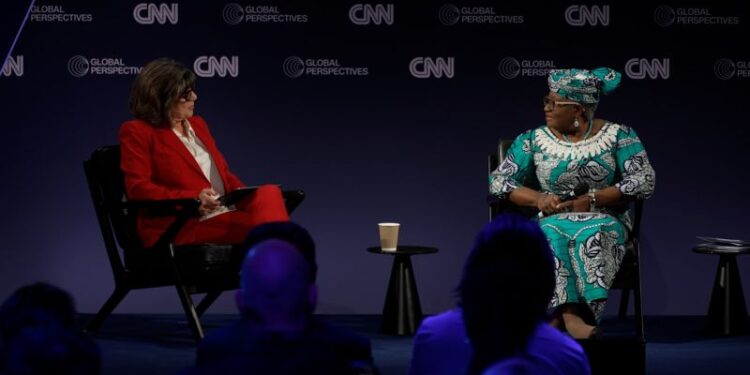The Director-General of the World Trade Organisation (WTO), Dr Ngozi Okonjo-Iweala, has criticised the structural barriers that make it cost about 20 percent more for African countries to trade with each other than with other regions, describing the imbalance as ‘something wrong’.
Speaking in an interview with CNN’s Christiane Amanpour, Okonjo-Iweala said the situation exposed deep inefficiencies in Africa’s trade systems. ‘It costs 20 percent more for us to trade with each other on the continent than with others externally. Something is wrong with that,’ she said.
According to the WTO chief, Intra-African trade accounts for only 15 to 20 percent of the continent’s total trade, compared with over 60 percent within the European Union.
AfCFTA seen as a game changer
Okonjo-Iweala said the African Continental Free Trade Area (AfCFTA) offered the best route to reducing trade barriers and unlocking regional value chains. However, she stressed the need for faster implementation.
‘The AfCFTA is one of the best things we have going on trade,’ she said, urging African leaders to act decisively. She illustrated the inefficiencies with an example from the textile industry: ‘Why don’t we buy this $200 million worth of textiles within the continent? If we’re spending $7bn importing the same kinds of textiles, why should Lesotho have to struggle?’
She said such dependence on imports for products that could be sourced locally undermines industrialisation and weakens domestic job creation.
Invest in skills and technology
Citing International Monetary Fund (IMF) projections that Africa’s economy will grow by around four percent this year and next, Okonjo-Iweala warned that such growth remains insufficient to absorb the continent’s fast-rising population.
‘By 2050, there will be 2.5bn people on the continent—about 22 percent of the world’s working-age population. If this population is skilled, it could be a resource for Africa and the entire world,’ she said.
She emphasised that investing in education, technology, and infrastructure was critical to turning demographic expansion into an economic advantage. ‘You can’t just say we have people, therefore we are rich. They’ve got to be skilled. We’ve got to be up with technology and AI,’ she added.
Optimism amid structural challenges
Despite persistent obstacles such as poor infrastructure, unreliable power, and low digital connectivity, Okonjo-Iweala expressed confidence in Africa’s future. She pointed to the ingenuity of young Africans driving innovation in fintech, agritech, health tech, and the creative sectors as evidence of a promising shift.
Her closing message to African policymakers was pointed: reduce the cost of doing business, empower people through skills and technology, and strengthen systems that enable the continent to trade effectively with itself—or risk forfeiting the benefits of one of the world’s most dynamic markets.


